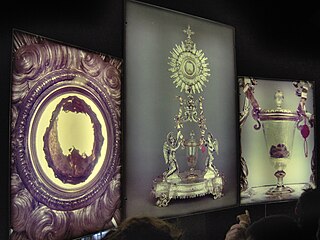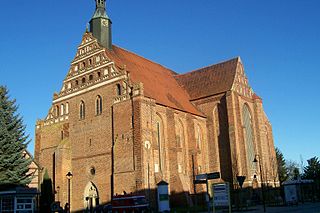Related Research Articles

The Prince-Bishopric of Brandenburg was an ecclesiastical principality of the Holy Roman Empire from the 12th century until it was secularized during the second half of the 16th century. It should not be confused with the larger Diocese of Brandenburg established by King Otto I of Germany in 948, in the territory of the Marca Geronis east of the Elbe river. The diocese, over which the prince-bishop exercised only spiritual authority, was a suffragan diocese of the Archdiocese of Magdeburg, its seat was Brandenburg an der Havel.
Prignitz is a Kreis (district) in the northwestern part of Brandenburg, Germany. Neighboring are the district Ludwigslust-Parchim in Mecklenburg-Western Pomerania, the district Ostprignitz-Ruppin in Brandenburg, the district Stendal in Saxony-Anhalt and the district Lüchow-Dannenberg in Lower Saxony.
Ostprignitz-Ruppin is a Kreis (district) in the northwestern part of Brandenburg, Germany. Neighboring are the districts Müritz and Mecklenburg-Strelitz in Mecklenburg-Western Pomerania, the districts Oberhavel and Havelland, the district Stendal in Saxony-Anhalt, and the district Prignitz.

Bad Wilsnack is a small town in the Prignitz district, in Brandenburg, Germany. The former pilgrimage site of the Holy Blood of Wilsnack has been officially recognised as a spa town (Bad) since 1929. It is the administrative seat of the Amt Bad Wilsnack/Weisen.

Havelberg is a town in the district of Stendal, in Saxony-Anhalt, Germany. It is situated on the Havel, and part of the town is built on an island in the centre of the river. The two parts were incorporated as a town in 1875. It has a population of 7,687 (2004).

The von Blumenthal family are Lutheran and Roman Catholic German nobility, originally from Brandenburg-Prussia. Other (unrelated) families of this name exist in Switzerland and formerly in Russia, and many unrelated families called Blumenthal, without "von", are to be found worldwide.

In Christianity, a Eucharistic miracle is any miracle involving the Eucharist. The Roman Catholic, Lutheran, Eastern Orthodox, Methodist, Anglican and Oriental Orthodox Churches belief that Christ is really made manifest in the Eucharist and deem this a Eucharistic miracle; however, this is to be distinguished from other manifestations of God. The Catholic Church distinguishes between divine revelation, such as the Eucharist, and private revelation, such as Eucharistic miracles. In general, reported Eucharistic miracles usually consist of unexplainable phenomena such as consecrated Hosts visibly transforming into myocardium tissue, being preserved for extremely long stretches of time, surviving being thrown into fire, bleeding, or even sustaining people for decades.

Wittstock/Dosse is a town in the Ostprignitz-Ruppin district, in north-western Brandenburg, Germany.
Anselm of Havelberg was a German bishop and statesman, and a secular and religious ambassador to Constantinople. He was a Premonstratensian, a defender of his order and a critic of the monastic life of his time, and a theorist of Christian history. According to Friedrich Heer, "the peculiar course of Anselm's life made this much-travelled man the theologian of development, of progress, of the right of novelty in the Church".

Heiligengrabe is a municipality in the Ostprignitz-Ruppin district, in Brandenburg, Germany.

The Bishopric of Havelberg was a Roman Catholic diocese founded by King Otto I of Germany in 946, from 968 a suffragan to the Archbishops of Magedeburg. A Prince-bishopric (Hochstift) from 1151, Havelberg as a result of the Protestant Reformation was secularised and finally annexed by the margraves of Brandenburg in 1598.

The Holy Blood of Wilsnack was the name given to three hosts, which survived a fire in 1383 that burned the church and village to the ground. The hosts were thus seen as miraculous. The relics became the destination of medieval religious pilgrimages to Bad Wilsnack, Germany for nearly two centuries. Revenue from the many pilgrims enabled the town to build the large St. Nicholas' Church at the site. The hosts were destroyed by reformers in 1558 during the Protestant Reformation.

Wallenborn is an Ortsgemeinde – a municipality belonging to a Verbandsgemeinde, a kind of collective municipality – in the Vulkaneifel district in Rhineland-Palatinate, Germany. It belongs to the Verbandsgemeinde of Daun, whose seat is in the like-named town. The municipality is a state-recognized tourism community (Fremdenverkehrsgemeinde).

Georg von Blumenthal was a German Prince-Bishop of Ratzeburg and Bishop of Lebus. He also served as a Privy Councillor of the Margraviate of Brandenburg and Chancellor of the University of Frankfurt (Oder), commonly called the Viadrina.

Heinrich von Bülow also known as Big Top (Grotekop) was a knight born in the middle of the fourteenth century. He died either before 1395 or during 1415. He prospered as a warrior-supporter of Prince Albrecht of Mecklenburg. Outside Mecklenburg, Heinrich Grotekop is still remembered in many quarters as an archetypal robber baron on account of his appetite for feuding.
Saldern or von Saldern, is the name of an old German aristocratic family from the areas of Hildesheim and Brunswick Land. The family seat of the same name is an eponymous castle on the River Fuhse in Salzgitter-Salder. Originally the family, whose branches are still alive today, only owned estates in the Lower Saxony area, but from the middle of the 16th century they also owned extensive property in the March of Brandenburg.

The Plattenburg is a water castle in the independent municipality of Plattenburg in the German district of Prignitz in northwestern Brandenburg. It was first documented in 1319, making it the oldest surviving water castle in northern Germany.
Ulrich Woronowicz was an East German Protestant theologian and writer.

The House of Bülow is the name of an old German and Danish noble family of Mecklenburg origin, members of which have borne the title of Baron (Freiherr), Count (Graf) or Prince (Fürst).

Dietrich von Bülow was a German Bishop of Lebus-Fürstenwalde.
References
- ↑ "Imperial Bishops: H-P". Archived from the original on 2007-08-20. Retrieved 2007-08-02.
- Wentz, Gottfried: Die Bistümer der Kirchenprovinz Magdeburg: Das Bistum Havelberg, part of Germania Sacra. Walter de Gruyter, Berlin 1933. Reprinted 1963. ISBN 978-3-11-001285-9 pp. 58–59